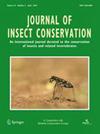在澳大利亚东部的放牧景观中,清除林地的草地具有较低的无脊椎动物多样性和不同的组合
IF 1.9
3区 农林科学
Q2 ENTOMOLOGY
引用次数: 0
摘要
放牧者利用林地清理来促进牧场生产,尽管对林地清理对本地动物的影响还缺乏了解。我们通过比较已清除林地(草地)与附近未清除林地中与地面植被相关的无脊椎动物来评估清除对生物多样性的影响。以引种牧草为主的2个重复草地与4个地点各2个林地相比较。每个草地和林地的相邻河岸林允许评估林地清除对相邻河岸带的影响。所有的栖息地都被放牧了。在每个站点采用3个1m 2的吸力亚样取样地面植被无脊椎动物。草食动物、传粉动物和大型无脊椎动物(鸟类的食物)的丰富度和丰度显著低于林地,而河岸林在所有指标上都非常相似。草原的无脊椎动物群落也明显不同于林地。BEST分析表明,地被盖度和凋落叶盖度与无脊椎动物组成相关性最强。这项研究表明,放牧管理依赖于清除昆士兰中部牧场的肥沃草地林地,改变了无脊椎动物的多样性和组合。因此,树木砍伐不仅会导致冠层生物多样性的丧失,也会导致地面植被的生物多样性的丧失。对昆虫保护的影响牧民有能力改善无脊椎动物的生物多样性,方法是将地面覆盖物(地面植被和凋落物)保持在80%以上,鼓励原生牧场取代引进物种(如Buffel Grass),并保留原生林地。本文章由计算机程序翻译,如有差异,请以英文原文为准。
Grasslands of cleared woodlands have lower invertebrate diversity and different assemblages to remnant woodlands in grazed landscapes of eastern Australia
Abstract Clearing of woodlands is used by graziers to promote pasture production, even though understanding of impacts of clearing on native fauna is lacking. We evaluate impacts of clearing on biodiversity by comparing invertebrates associated with ground-layer vegetation of cleared woodlands (grasslands) to that of nearby uncleared woodlands. Two replicates of grasslands consisting of pastures dominated by introduced grasses were compared with two woodlands at each of four locations. The adjacent riparian forest to each grassland and woodland site allowed evaluation of the effect of woodland clearing on the adjacent riparian zone. All habitats were grazed. Invertebrates of ground-layer vegetation were sampled using three suction subsamples of 1m 2 at each site. Grasslands had significantly lower order richness and abundance of herbivores, pollinators and macroinvertebrates (food for birds) than the woodlands, whereas the riparian forests closely resembled each other in all metrics. Invertebrate assemblages of grasslands also differed significantly from those of the woodlands. BEST analysis showed that groundcover and leaf-litter percentage cover correlated strongest with invertebrate composition. This study has demonstrated that grazing management relying on clearing of fertile grassy woodlands of the rangelands of Central Queensland alters invertebrate diversity and assemblage. Thus, tree clearing not only leads to biodiversity losses in the canopy layer, but also in the ground-layer vegetation. Implications for insect conservation Pastoralists have the capacity to improve outcomes for invertebrate biodiversity by maintaining groundcover (ground-layer vegetation and litter cover) above 80%, by encouraging native pastures over introduced species such as Buffel Grass and by retaining native woodlands.
求助全文
通过发布文献求助,成功后即可免费获取论文全文。
去求助
来源期刊
CiteScore
3.60
自引率
10.50%
发文量
76
审稿时长
6 months
期刊介绍:
The Journal of Insect Conservation is an international journal devoted to the publication of articles concerned with the conservation of insects and related invertebrates. The Journal of Insect Conservation publishes papers on all aspects of conservation and biodiversity related to the insects and closely related groups such as Arachnids and Myriapods, including ecological work which has conservation implications. Research papers may address the subject at the community, population or species level, may cover aspects of behaviour, taxonomy or genetics, be theoretical or practical, and be local or global in nature. Review articles are welcome as well as points of view which are likely to stimulate debate. From time to time the journal will publish Special Issues on specific subject areas which are the focus of current research. Proposals for such issues are welcome.

 求助内容:
求助内容: 应助结果提醒方式:
应助结果提醒方式:


